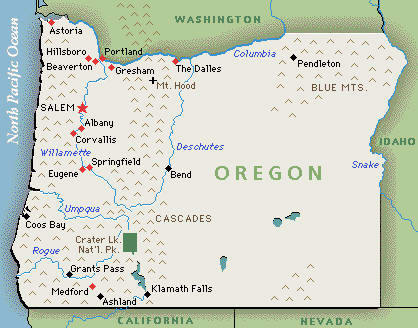 With Oregon's cannabis surplus so big that authorities estimate 70% of the state's output goes unsold, "craft" producers are calling for a novel solution—allowing export to other states that have legalized.
With Oregon's cannabis surplus so big that authorities estimate 70% of the state's output goes unsold, "craft" producers are calling for a novel solution—allowing export to other states that have legalized.
The cannabis market is flooded in the Beaver State, and that's a real problem for an industry that has seen explosive growth since Oregonians voted to legalize in 2014. But some say this provides an opportunity.
With export across state lines presenting itself as an obvious solution, voices in the industry say the time may be ripe to push for federal approval of an interstate cannabis trade.
Harvests getting trashed?
Oregon's authorities are now documenting the well-known market saturation. The state's cannabis industry is already so overstocked that it could meet consumer demand for the next six and a half years, according to an analysis by the Oregon Liquor Control Commission. The study, based on data from three years of production and more than two years of legal sales, was turned in to lawmakers late last month.
As The Oreginian notes, the study found that between July 2017 and June 2018, demand represented 50% of supply, with the remainder languishing in inventory. The state's licensed producers last year harvested upwards of 2,000 metric tons—some 4.4 million pounds. And if the state approves all pending producer licenses, Oregon will be on track to churn out an estimated 4,000 metric tons this year .
Licensed retail outlets supply only slightly more than half of the cannabis consumed in Oregon, the study found. About 45% of consumption comes from other sources, including home cultivation (with four plants per household permitted), the medical marijuana sector, and the illicit market.
And as the Bend Bulletin notes, the study immediately follows an audit by Oregon's Secretary of State of how the Liquor Control Commission and Oregon Health Authority have been regulating the recreational and medical marijuana markets. The auditors found that regulators have not kept up with mandatory inspections—or done enough to prevent diversions to the illicit market.
These findings also follow a report issued last year by Oregon law enforcement with even more dramatic figures. The August study by the Oregon-Idaho High Intensity Drug Trafficking Area Program—made up of local, state and federal agencies—found that nearly 70% of the legal recreational marijuana grown in Oregon is going unsold. While the study implied that much of that 70% is simply being trashed, it also raised the specter of illicit-market diversion.
"What is often lost in this discussion is the link between marijuana and serious, interstate criminal activity. Overproduction is rampant, and the illegal transport of product out-of-state—a violation of both state and federal law—continues unchecked," said Billy Williams, US Attorney for Oregon, speaking to the Associated Press. "It's time for the state to wake up, slow down and address these issues in a responsible and thoughtful manner."
The AP account on the Oregon-Idaho report also noted a recent state-commissioned study by the University of Colorado Boulder finding that most growers in the Centennial State were planting less than half of their legal allotment—and still meeting demand. So this problem does not seem confined to Oregon.
Interstate cannabis trade proposal
A group of Oregon cultivators is proposing an unorthodox way out of this dilemma: it is lobbying legislators in Salem to pass a bill that would allow the state to enter into cannabis transfer agreements with other states. Sen. Floyd Prozanski, a Democrat from Eugene, has introduced such legislation, and hopes it will pass in the coming session at the statehouse.
The Craft Cannabis Alliance, a grouping of small producers, is avidly promoting the idea. "There is only one way to address this problem, and it's to demand we get access to markets around the country," Adam Smith, the group's director, told Portland Busness Journal. "This region could and should be building a world-class industry for this product, but we can’t do that under federal prohibition, no matter what we do on the margins here."
The proposal does appear to be in a race against time, with opposite solutions also being floated. Gov. Kate Brown has submitted a bill to the Legislature that would limit new cultivation licenses.
"The governor isn't wrong to want to look at limiting new licenses," Smith conceded. "But we need to have a conversation about the long-term vision for this industry. We need to make a plan that will reward the people who are already in the industry, investing in Oregon and struggling to survive."
Of course, for this idea to fly, there would have to be some kind of federal acquiescence—as interstate trade would be treading on the authority of Washington DC far more clearly than does intra-state. But with a bill to deschedule cannabis now pending on Capitol Hill, an integrated national cannabis industry, with authorized trade across state lines, may no longer so unthinkable as it seemed just months ago.
Cross-post to Cannabis Now
Photo by GreenwichMeanTime







Recent comments
2 weeks 3 days ago
2 weeks 4 days ago
5 weeks 4 days ago
6 weeks 4 days ago
10 weeks 4 days ago
14 weeks 2 days ago
18 weeks 3 days ago
19 weeks 1 day ago
29 weeks 1 day ago
33 weeks 1 day ago